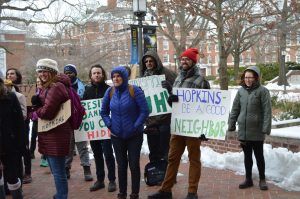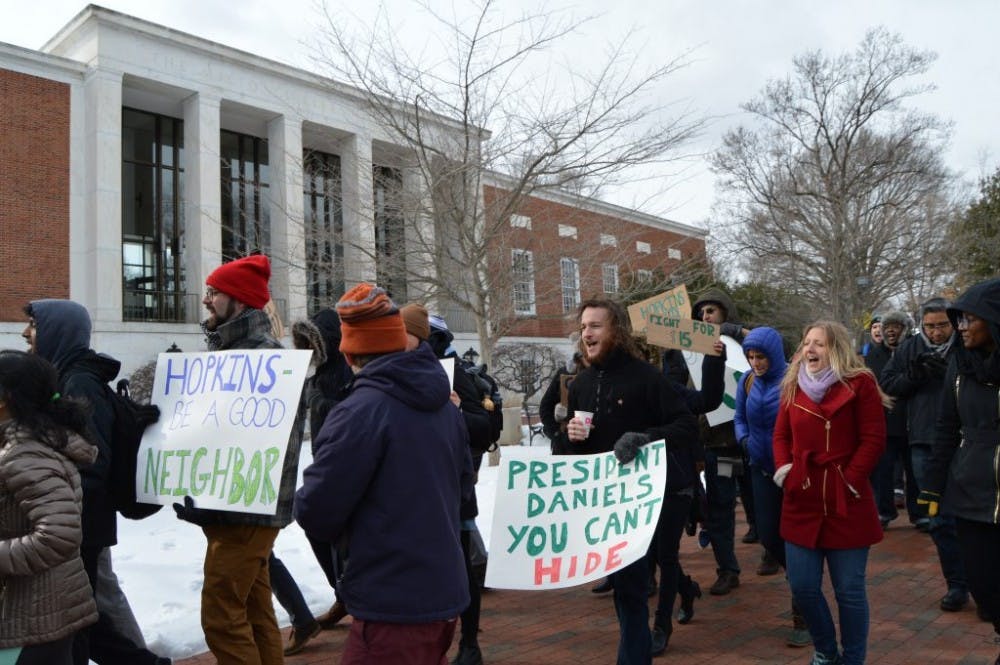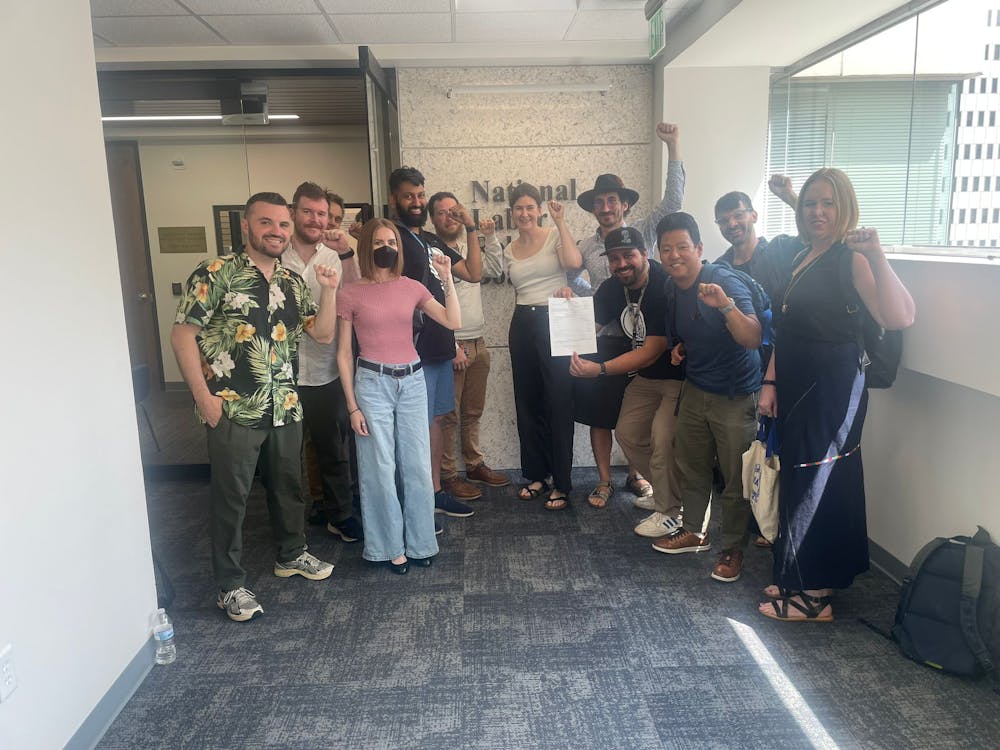After insisting on meeting solely with the student members of the Student-Labor Action Coalition (SLAC), the University agreed on Monday to also meet with contract worker unions on March 31.
SLAC has been advocating for job security and benefits for University security guards and dining workers since November.
At a rally on Wednesday, about 40 protesters gathered on the Beach and marched to Garland Hall to deliver a petition signed by 1200 students to reiterate their concerns.
Their demands include raising their minimum wage to $15 per hour, guaranteeing individual workers’ job security if the University changes contractors and a program similar to the Live Near Your Work initiative, which provides housing grants for University employees.
Hopkins does not directly employ contract workers, so they do not receive the benefits of the University’s employees.
Krista Strothmann, coalition member and vice president of the union that represents dining workers, Unite Here Local 7, looks forward to the upcoming meeting.
“We are very excited that the administration has agreed to meet with our coalition,” she said. “We have a date and a time. It actually seems for real.”
While marching, they chanted slogans such as “President Daniels, rich and rude, we don’t like your attitude” and “What do we want? Equality? When do we want it? Now!” They also carried signs which read “Hopkins Creates Poverty” and “Ronnie D, We Will Not Go Quietly.”
The marchers stopped in front of Garland Hall, where a delegation of coalition members went inside to hand the petition to administrators Toni Blackwell, senior associate dean of students, and Jonathan Links, vice provost and chief risk and compliance officer.
Senior Corey Payne, SLAC member and co-chair of Students for a Democratic Society (SDS), reported that the delivery went smoothly.
“It was very polite and cordial,” he said. “We gave them our petitions, and we raised a few other concerns.”

The marchers then went back to the Beach, where residents from neighborhoods affected by University policies came to make speeches on behalf of the contract workers.
Terrel Askew, a 20-year resident of Remington, emphasized the importance of Hopkins providing affordable, quality housing for contract workers.
“[This is not hard], as the University’s Live Near Work program attests,” he said. “Its greatest caveat, however is that it doesn’t go far enough. No program that only speaks to a small subset of its employees possibly could.”
He criticized the University for setting a poor example as Baltimore’s largest employer.
“To me, it makes it seem as though it is okay to not protect your workers and give them the rights that they deserve,” Askew said later in an interview. “Having been in the city as long as they have, they should know better and act accordingly.”
Speaker Brandon McGoogan, a resident of East Baltimore, also urged for the University to take initiative in protecting workers’ rights.
“We all know the impact and influence Johns Hopkins University can have in addressing these concerns, and yet they don’t even have the time to hold a conversation,” he said.
The resident speakers were brought with the help of SLAC’s partner community organizations such as United Workers and the Baltimore Housing Roundtable, which work to establish affordable housing for Baltimore’s workers.
Adriana Foster, member of the Baltimore Housing Roundtable, spoke to the importance of providing equal benefits to low-wage contract workers at Hopkins.
“[Housing instability] is an issue that a lot of people face all across the city, especially low income folks and workers,” she said. “I’m glad that we are out here and able to fight because these [contract workers are] not receiving a good wage, and that terribly inhibits their ability to have home ownership opportunities and stable housing.”
Senior Brandon Block explained why he joined the rally. He had participated in the last SLAC demonstration in Garland.
“I read the statement from Provost Shollenberger and found it rather condescending that somehow, refusing a meeting was to ‘respect the integrity of the bargaining progress’ between Bon Appétit and Local 7,” he wrote in an email to The News-Letter. “It’s just the opposite. Refusing to meet with the labor coalition shows a disrespect for the bargaining process.”
Freshman Mira Wattal, a member of SDS, felt that the demonstration was a success.
“I felt that turnout was larger than what I expected,” she wrote in an email to The News-Letter. “On behalf of the SLAC, we want to thank all members of the student body, professors and workers who came out today and are united in this fight.”





